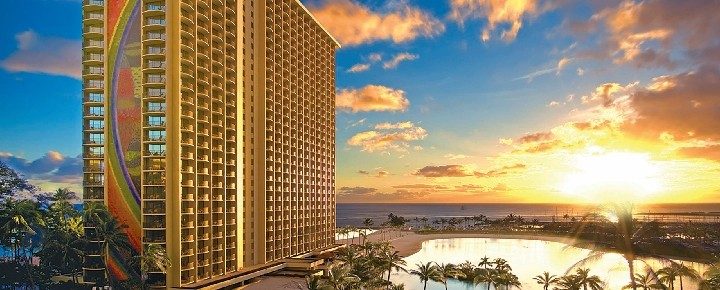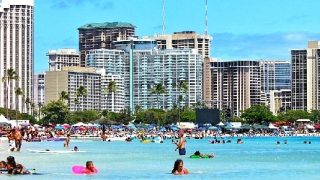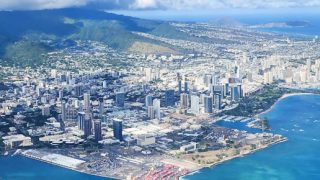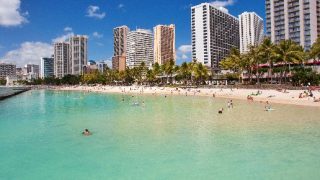We hear it all the time. The suggestion is that Hawaii is ripping off its visitors. The reality isn’t how some commenters would like to portray it, and it is far more complicated than that.
Countless people have blamed the state for the high costs of Hawaii travel and questioned what it is doing with their hard-earned dollars. And there are no two ways about it, the cost of Hawaii vacations (and non-Hawaii vacations) has skyrocketed. We see it, too, when planning trips outside of Hawaii instead of your trips to Hawaii.
Why Hawaii Visitor’s Money Doesn’t Always Help Hawaii.
Sure, we’d like to think that at least a good part of the money we spend on a hard-earned vacation would return to the local economy. Ideally, it would help local businesses and, in doing so, offset Hawaii tourism’s negative impacts.
However, that isn’t exactly what’s happening. Most of the money spent in Hawaii doesn’t stay in Hawaii. For the large part, it ends up feathering the pockets of big companies with little to some Hawaii connection. That’s true, however, for so many other visitor destinations everywhere, and it comes at a time when more than ever before, global tourism is eroding the quality of life in places from Hawaii to Barcelona, Greece, and elsewhere.
Where you stay matters.
When it comes to Hawaii accommodations, corporate hotels return far less to the local economy than do locally owned ones. It just isn’t hard to figure out. Search for who owns XYZ hotel and you’ll soon know where it is own. See the example below.
Locally owned hotels and vacation rentals retained more than 90% within the local economy. However, we must point out that non-residents own most Hawaii vacation rentals.
Support Hawaii through where you eat, stay, and shop.
You can’t wholly support local, but you can, to a large degree, do so and help Hawaii.
- To support local, look for Hawaii-owned companies rather than national businesses. That helps to move the needle towards a more sustainable Hawaii tourism product.
- Seek out locally-owned restaurants, especially ones focused on locally-grown food products. Shop at Hawaii farmers markets.
- Be suspicious. Research. Don’t assume something’s locally owned or produced; check and ask questions. Did you know, for example, that many inexpensive Hawaiiana souvenirs visitors assume are from Hawaii are actually from the Philippines?
- Car rentals are more problematic because there’s a comfort level renting from national brands. Turo has its own issues, but, on the other hand, it can be an option to go more local.
- Seek out and stay at Hawaii-owned hotels and vacation rentals.
Taxes, taxes, taxes. Those do stay here, somewhere…
The taxes you pay, however, do stay here in Hawaii, so that’s on the state regarding what happens with that money. It’s an area where you’re likely to find a lot of agreement between visitors and residents. We all don’t see where it goes. As you may know, Hawaii taxes everything, including food, and both residents and visitors pay all taxes, including those on accommodations. But that’s outside the scope of what we’re discussing here, and Hawaii’s taxation and spending of tax money is certainly something we might all consider. Recently a bill started through the Hawaii Legislature to implement a 33% accommodation tax.
Why most money visitors spend in Hawaii doesn’t stay here.
1. What about Hawaii accommodations?
Large hotel chains aren’t owned in Hawaii. The money is shared between the owners, based elsewhere, and their management company. Not to say that many jobs aren’t being created locally because they are. Are those high-paying jobs? Mostly not. So, simply put, much of the money visitors spend on hotel stays doesn’t stay in Hawaii. And the rates charged are up to those corporations, which Hawaii has no control over.
The featured image above is of Waikiki’s iconic Hilton Hawaii Village. Park Hotels and Resorts own it. That company “is one of the largest publicly-traded lodging real estate investment trusts (REIT).” That’s the norm rather than the exception, and a simple search of “who owns” yields this about virtually any Hawaii hotel.
When you stay at a vacation rental, chances are some money remains in Hawaii, depending on the circumstances. If you rent from publicly traded, troubled Vacasa, that isn’t the case, while if you rent from a local management company or a Hawaii-based owner directly, far more of the money stays here. Also, remember that there is a money split between the property owner and the vacation rental management company, and many, if not most, vacation rental homeowners aren’t based in Hawaii. More than three out of four Hawaii vacation rentals are believed to be owned outside Hawaii.
2. Where does Hawaii car rental money go?
The same is true at Hawaii car rentals. These multinational corporations have cars and staff in Hawaii, but again, most of the profit is exported, and the jobs created aren’t, for the most part, high-level.
3. What about Hawaii restaurants, grocery stores, and farmers’ markets?
Some restaurants, even chain ones, are locally owned. But that’s not always the case. One example is Roy’s restaurants, which are Hawaii-owned.
And speaking of food, most of the food sold and consumed in Hawaii is not produced here.
Grocery stores are generally unclear in terms of ownership. While there’s no doubt about that when you go to a Hawaii Safeway, local stores are more confusing. Hawaii’s Times Markets, for example, is owned by Tokyo-based Don Quijote Holdings Co., Ltd. Foodland grocery stores, on the other hand, as well as KTA Super Stores, are Hawaii-based company and always have been. ABC Stores are Hawaii owned.
Therefore, food money from a grocery store or a restaurant is often heading straight out of Hawaii.
That isn’t true at Hawaii Farmers Markets, where most of the money stays on the island.
4. Hawaii activities are generally local businesses.
Most activities are likely to be island-owned and operated. That’s one industry you can generally be sure of. Buy them directly from the provider rather than via TripAdvisor’s Viator.
5. Hawaii airline tickets, not so much.
The only airline with a strong Hawaii basis is Hawaiian Airlines. While other airlines, including Southwest, United, and others, maintain a significant number of Hawaii employees, as with hotels, the jobs created in Hawaii aren’t, for the most part, high-level. Hawaiian remains the largest private employer in Hawaii, and nearly their entire team of some 7,000 staff at all levels is based here. So that does keep a much larger part of the money in the state. But as we’ve mentioned, even Hawaiian is a registered Delaware corporation, not a Hawaii one. And their telephone call center is outsourced to the Philippines.
We look forward to your thoughts. Can you share examples of ways you’ve been able to help Hawaii by thinking locally instead of globally?







If we want people investing in Hawaii, we can’t begrudge them taking a return on their investment.
Thank you so much for this article! It gave so much clarity of where tourist dollars go. This is so helpful and I wish everyone, especially every would-be HI tourist would read it!
Purchasing from Hawaiian Based Companies and Farmer’s Markets directly put money into the hands of Hawaiians, it undoubtedly trickles down into the economy quickly and in more amounts. Support them first. The Conglomerates that cater to the Tourists do contribute to the economy with their expansionist ideas, they also employ many people as Staff. Construction workers, skilled workers and laborers too. Those wages directly effect the economy through buying power. If the State and Local Governments would get Their collective acts together, do what IS Necessary to create a workforce that is currently capable of working but chooses to accept types of Assistance that allow them not to, the work participation would be amazing. Support Hawaiians!
Elizabeth I truly believe that you are poking at an Enormous Bee’s Nest and it may not end well. Believing that by now it should be common knowledge, there seems to be a collusive environment which encompasses the entire State of Hawaii. The only true industry in Hawaii which is mostly controlled by Large Offshore Corporations has Deep “Pockets” and Immeasurable Political Clout that Allows them to Get and Do whatever they want. Politicians are Dumd in Hawaii! That Industry has a Fatal Flaw, They’re not going to pull up their properties and move away. The “Quid Pro Quo” must be Enormous to Keep that many People, and Politicians, Happy and In Line! Anyone know what RICO is?
STR’S do have a wide variety of owners, some are your neighbors and live in Hawaii. Some owners are out of State and living on the mainland, they purchased their home, or homes, as a partial or full income producing stream. Purchasing a home intent on living in it for up to 3 months a year and as a STR for the balance to offset the abusive property and other taxes worked well 20 years ago, lately not at all. Selling the property is a possibility, appreciation has been decent, but not enticing. It’s not what was intended. Islands float on water someday to sink, Hawaii’s Finances Sink year to year! Be a Dairy Farmer, Milk all of your Cows and Not just the chosen one’s!
The airb&b industry is either quelled or almost in oahu. If the state was so concern with the wellbeing of its citizens, why has it allow the big corporations to limit homeowners from creating some income.
Sadly, one person’s freedom to make “some income” usually costs another group’s freedom. We aren’t free when our living environment degrades our high quality of life. But we also aren’t free when struggling to survive, and effectively indentured servants to the rich. So the real issue is balance – How can rentals improve everyone’s quality of life? I think we can all agree that the answer to that question isn’t Airbnb, and isn’t prohibiting all short-term rentals. High taxation can probably provide an answer, in conjunction with great social policy to ameliorate the regressive aspects of that taxation.
I actually don’t agree that Airbnb doesn’t improve quality of life.
As typical, the “horror” stories stand out, when in fact, there are more “wonderful” stories with Airbnb happening all around us.
I am a 64 year old woman who is making enough money for the first time in my life that I am not housebound.
In the 10 years that I’ve been hosting, I have never had one complaint from my neighbors.
Before I started short term renting, I never helped the economy , but now I employ housekeepers, handymen, lawn service, and my guests shop locally.
Please let’s get rid of bad hosts, and let the good hosts continue providing a good service.
Hi Tony D! Additional Taxation on just One Class of people for the satisfaction of greater and greater income just leads to a Constant Repeat of the same, just like it will be now. The “Proper and Wise” thing to do is raise taxes unilaterally on every resident, cut spending on certain programs, force people from assistance that are able bodied and require people to Work. Those who still receive assistance should be required, as able, to work to continue to receive. Imagine the amount of jobs filled, the Revenue Saved and New Revenue!
One thing beat of Hawaii should look into is price gouging by the foodland near sharks cove on the North shore the prices they charge is criminal they rob locals as well as tourists send a reporter out to have a look..it’s absolutely ridiculous its stealing really..please check it out and do a report..thank you Mark
I know, it’s unfortunate. I bought my condo on Maui 20 years ago, because I fell in love with Hawaii (not only Maui, but the the Hawaiian culture in general). My dream was to live here and I finally arrived. I even got divorced because my (now ex-) husband didn’t want to move here. I initially hired a management co. (unfortunately, they didn’t represent us) then helped people from Molokai, California or Washington to rent out condo because they were moving for a job (pediatrician at Kaiser, road construction supervisor from Molokai etc.) I never increased the rent and most of my previous tenants were either local or are now permanently living here, so please don’t put everyone under 1 rug!
“Shop local when possible and then read our other article on why we think it’s great Southwest is trying to eliminate our local airline”… real double standard on this site.
I don’t know IDA2NALU… SWA has aggressively competed for market share and BOH has simply reported what they are doing. They have correctly pointed what’s good and bad about SWA and HA, that’s fair reporting. The bottom line is the airlines are competing and HA is getting even better as a result. Their new terminal with state of the art TSA makes HA the logical choice if you are departing HNL and will greatly improve HA’s position even more. Bottom line, as I read in the story, is flying HA supports the Hawaii economy more than any other airline and is good for the State, which is good for tourists and residents alike. Don’t shoot the messenger, just support “buy local and fly local”.
I love old Hawaiian culture. I pray more money goes to the local schools God love the Kikis
That “local” spot/activity may not even be local, but just some foreigner or mainlander who moved here trying to get theirs. And some local spots don’t pay or treat their employees well either. Local vs non-local hotels is irrelevant since most hotels are pretty full anyway and sidesteps the fact that barely half of visitors actually stay in hotels, who employ 40k people btw. Staying in condos, timeshares and vacation rentals with money going who knows where. But the worst of all are airlines not named Hawaiian, making billions of dollars shuttling millions to our shores with just a handful of local employees to show for it. Fly Hawaiian, stay at a hotel, spend money and you’ll be doing better and contributing more than most, sad to say.
I’ve heard it said that the majority of vacation rentals are not locally owned’.
I wonder if this is true. Do you have a source for that assertion?
Hawaiians expertise in Hawaii aviation benefits the entire industry. It’s important to have a local expert, in the same way Alaska contributes to the industry by being the acknowledged Alaska expert. Let’s hope they never merge with anyone!
What you’re not seeing in this article is the fact that Hawaii tourism tax dollars go a long way to support our local hospitals think of that next time one of your family members has to stay in 1… They are not making a profit And tourism is helping to keep them open.
You didn’t answer the question of where all the ad on taxes for hotels and rental cars go.
Nice article and very much agree with you.
Great article! Good to know that Foodland and ABC are local, but we need farmers markets on the West side of Maui and a total stop to timeshares!
I was watching YouTube – “Strong Towns – Talks at Google” and their analysis shows that cities are primarily funded by the “crowded downtown” while all the people who live in the suburbs are using city services subsidized by the dense old downtowns. They have seen this pattern repeated over and over throughout the US. If this pattern holds for Hawaii, then it is the dense areas where most city revenue is derived — presumably from tourist spending. Interestingly, having a bunch of rich residents seems to provide little benefit to city finances (usually exactly the opposite since suburban homeowners require city infrastructure maintenance – water, electricity, police, roads, medical, fire, etc.)